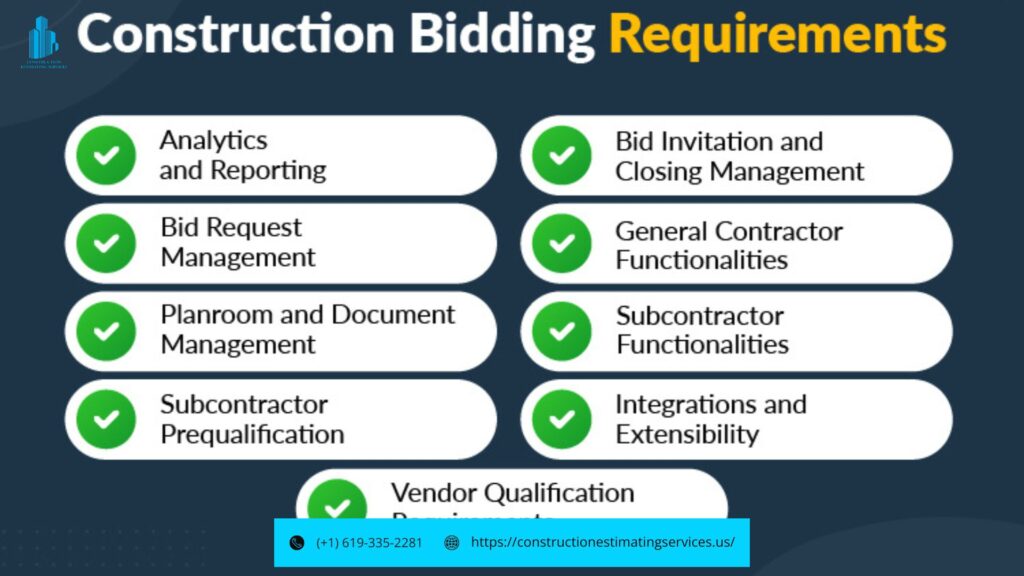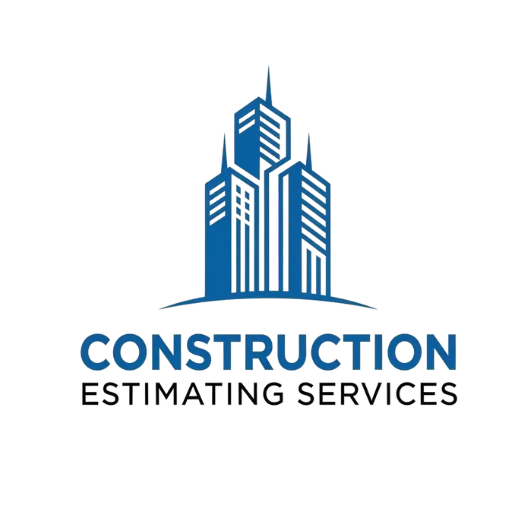Have you ever submitted a bid, feeling confident that your numbers were sharp, only to find out later that someone else got the contract? It happens to contractors every day. But the biggest mistake isn’t just losing the bid—it’s not knowing why you lost.
Some contractors are consistently winning high-value projects, while others keep struggling. The difference? Smart bidding strategies.
Winning bids isn’t just about offering the lowest price—it’s about knowing how to price, present, and position your bid to stand out. If you’re tired of losing bids, this guide will show you how to start winning more projects without sacrificing profit. Ready to take your bidding game to the next level? Contact us at or call us at (+1)540-578-7926 to get expert help today.
1. Stop Guessing – Use Data to Price Bids Accurately
Why Most Contractors Either Underbid or Overbid
Underbidding = Winning the project but losing money.
Overbidding = Losing the project before it even starts.
Smart bidding = Pricing it right to stay competitive and profitable.

Real-World Example:
A contractor submits a bid for a commercial office build, estimating material costs based on last year’s pricing. By the time the project starts, material prices have increased by 12%, cutting into the profit margin. Meanwhile, another contractor used up-to-date cost data, pricing their bid accurately and winning without losing profit.
How to Bid Smarter
✅ Use real-time material and labor cost data instead of past numbers.
✅ Get multiple supplier quotes before finalizing your pricing.
✅ Factor in potential price increases to protect your profit.
For more insights on tracking material costs, check out this Construction Dive article on rising material prices.
What Contractors Are Asking Right Now
How do I price my construction bid competitively?
What’s the best way to calculate labor and material costs?
How do I estimate project costs accurately?
2. Make Your Proposal Stand Out (Because Pricing Isn’t Everything)
Why Some Contractors Win Even When They Aren’t the Lowest Bidder
If clients always chose the lowest price, big construction firms wouldn’t exist. The truth is, owners don’t just want the cheapest bid—they want the best value.
Real-World Example:
Two contractors submit bids for the same project.
Contractor A: Offers a low price but provides a basic, rushed proposal.
Contractor B: Prices slightly higher but includes a detailed breakdown of costs, project timeline, and risk management strategies.
The result? The client picks Contractor B because they look more reliable and professional.
How to Make Your Bid Stand Out
- Provide a clear breakdown of costs, materials, and labor.
- Explain how you’ll handle project challenges and avoid delays.
- Highlight past projects and client testimonials to build trust.
What Contractors Are Asking Right Now
How do I write a construction bid that wins projects?
What do clients look for in a contractor’s proposal?
How detailed should my bid proposal be?
3. Understand What Clients Really Want (Hint: It’s Not Just Price)
Why Some Contractors Keep Winning Repeat Clients
Winning a bid is great, but winning repeat business is better. The key? Understanding what clients actually care about.
Real-World Example:
A contractor wins a warehouse construction project, not because they were the cheapest, but because they showed expertise in similar projects and had strong referrals.
What Clients Look for in a Contractor
- Experience in similar projects. Clients want proven success.
- Reliability & communication. Contractors who stay responsive win more work.
- Problem-solving skills. How will you handle unexpected delays or cost overruns?
Learn more about client expectations from this Forbes article on building trust in construction.
What Contractors Are Asking Right Now
How do I convince clients to choose my bid?
What makes a contractor’s bid more attractive?
How do I build trust with new clients?
4. Reduce Bid Rejections by Avoiding Common Mistakes
The Hidden Reasons Bids Get Rejected
Many contractors lose bids for avoidable reasons—not because their price was too high, but because they made simple mistakes.
Common Bid Mistakes That Cost Contractors Projects
- Submitting a generic proposal without project-specific details.
- Failing to meet client requirements in the bid.
- Forgetting to include permit and compliance costs.

Real-World Example:
A contractor bids on a public infrastructure project, but their proposal misses a required insurance certification. Even though their pricing was competitive, the bid was immediately rejected.
How to Prevent Bid Rejections
- Read bid requirements carefully before submitting.
- Ensure all compliance, licensing, and insurance details are included.
- Customize each bid instead of using a one-size-fits-all template.
What Contractors Are Asking Right Now
Why do my bids keep getting rejected?
How can I avoid mistakes in my construction proposals?
What should I double-check before submitting a bid?
5. Follow Up on Bids (Because Silence Doesn’t Mean You Lost)
Why Smart Contractors Always Follow Up
Many contractors assume if they don’t hear back, they lost the bid. But that’s not always the case. Clients review multiple proposals and sometimes need more details before making a decision.
Real-World Example:
A contractor submits a bid and hears nothing. Instead of moving on, they follow up with a phone call and ask if the client has any concerns. The client asks for a minor revision, and the contractor ends up winning the project.
How to Follow Up Without Being Pushy
✅ Wait a few days, then send a short email checking in.
✅ Offer to answer any questions or provide more details.
✅ If rejected, ask for feedback to improve your next bid.
For tips on effective follow-ups, see this Entrepreneur guide on client communication.
What Contractors Are Asking Right Now
Should I follow up after submitting a construction bid?
How long should I wait before checking on my bid status?
What do I do if my bid is rejected?
How to Start Winning More Bids Today
If you’re tired of losing bids and want to start winning more projects without cutting your prices too low, follow these steps:
✔ Use accurate, real-time cost estimates instead of guessing.
✔ Make your proposals detailed and professional to stand out.
✔ Focus on what clients really want—not just the lowest price.
✔ Avoid common bid submission mistakes that lead to rejections.
✔ Follow up on bids to increase your chances of getting hired.

Conclusions
Winning more construction bids isn’t just about offering the lowest price—it’s about proving you’re the best choice for the job. If you apply these strategies, you’ll start winning more projects, increase your profits, and build a reputation as a go-to contractor. Need help crafting winning bids?
Reach out to us at or call (+1)540-578-7926 for professional estimating services. Don’t let another project slip away—contact or dial (+1)540-578-7926 today!
Frequently Asked Questions
How Do I Price My Construction Bid Competitively?
To price your bid competitively, use real-time data for material and labor costs instead of relying on outdated numbers. Get multiple supplier quotes and factor in potential price increases to protect your profit margin while staying attractive to clients.
What’s the Best Way to Calculate Labor and Material Costs?
The best way is to combine current market rates for labor with up-to-date supplier pricing for materials. Use project management software or cost databases, and always include a buffer for unexpected changes in costs or scope.
How Do I Estimate Project Costs Accurately?
Start with a detailed scope of work, then break down costs into materials, labor, equipment, and overhead. Cross-check your estimates with historical data from similar projects and adjust for current market trends to ensure accuracy.
How Do I Write a Construction Bid That Wins Projects?
Craft a detailed, professional proposal that includes a clear cost breakdown, project timeline, and risk management plan. Highlight your experience and past successes to show value beyond just price.
What Do Clients Look for in a Contractor’s Proposal?
Clients want a mix of competitive pricing, reliability, and expertise. They look for detailed plans, proof of past success (like testimonials), and assurance you can handle challenges like delays or cost overruns.
Why Do My Bids Keep Getting Rejected?
Your bids might be rejected due to common mistakes like missing project-specific details, failing to meet client requirements, or omitting costs like permits and insurance. Always review bid guidelines carefully.
How Can I Avoid Mistakes in My Construction Proposals?
Double-check client requirements, customize every proposal, and ensure all compliance details (e.g., licenses, insurance) are included. A thorough review before submission can catch errors that lead to rejection.
Should I Follow Up After Submitting a Construction Bid?
Yes, following up shows initiative and keeps you top-of-mind. Wait a few days, then send a polite email or make a quick call to check in, offer more details, or address concerns.
How Long Should I Wait Before Checking on My Bid Status?
Wait 3-5 business days after submission to give clients time to review. If there’s a specified timeline in the bid request, follow that instead. Timing your follow-up right can make a difference.
What Makes a Contractor’s Bid More Attractive?
A bid stands out with a clear cost breakdown, a realistic timeline, and proof of reliability—like past project examples or strong communication skills. Clients choose value and trust over just the lowest price.












